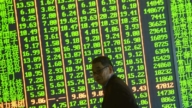【新唐人2013年07月13日訊】今年上半年,中國大陸306個城市的土地交易,同比大幅增長60%。有的大城市半年之內賣地的數量,接近去年全年的水平,還有的甚至比去年同期增長超過27倍。同時因為投資過熱,接近倒閉的地方政府也在湧現。業內專家表示,中國局部經濟危機正在悄然發生,隨著財政收入增速下降、地方債務還債高峰來臨,以及在「錢荒」背景下,賣地成為各地政府最現實,最快捷的財源。
據大陸財經媒體報導,全中國上半年306個城市共交易土地1萬5493筆,入帳人民幣1.13萬億元,與去年同期相比大幅增加60%。其中,北京、上海、廣州商業土地出讓金額超過1739億元,逼近去年全年總額。杭州同比漲幅最大,為410%,廣州以368%的同比漲幅位居第二。
另外,報導說,內蒙古有「鬼城」之稱的鄂爾多斯市,負債高達2000億到4000億,地方當局不得不向企業施壓,借款15億來發放公務員工資。據上海《新民週刊》分析,如果允許破產,至少有16個地方政府瀕臨倒閉。
美國資深經濟分析師、經濟學家簡天倫:「地方政府越來越依靠賣地來作為財政收入,而現在經濟不好的情況下,收稅各方面收入減少,它也希望賣更多的地,價錢是由政府說了算,而且每年賣多少地也是由他們在控制。」
過去,買地的主要是私人企業,近年來,石油、電力等擁有巨額財富的國營企業,也加入買地行列,導致地價不斷攀升,同時帶動房產泡沫越吹越大。美國資深經濟分析師簡天倫認為,這也是錢荒的一個原因,因為很多企業都把盈利投資於地產,而中國的地價上漲和房地產泡沫都是「國進民退」政策造成的。
簡天倫:「產能過剩,放貸可能出現收不回來,地方債大約有1/3用於還舊債,這跟錢荒都有關係,這麼多年出口、投資兩個主要的龍頭,投資現在減少了,出口在下降,所以經濟前景肯定不好。」
「瑞銀財富管理」亞太區首席投資總監認為,中國大陸經濟放緩加上信貸緊張,中央希望市場自我調節,沒有推出經濟刺激政策的跡象,估計下半年內地部分行業將明顯出現破產潮,當中也許涉及國企。
北京天則經濟研究所副所長馮興元:「有些人說今年都可能出現危機,但是一般說這種話,都是有一個假設前提,就是政府不調整政策,目前有三大可能的危機,一個是房地產,房地產會不會崩盤,第二個是地方政府負債,會不會出現比這更 大的債務危機,第三個是政局方面,這個就更無法預料。」
北京「天則經濟研究所」副所長馮興元還指出, 局部危機已經在發生,東部的製造業危機已經存在,地方政府違約現象也不少,出口保持負增加,在印發了相對GDP200%的鈔票後,還出現錢荒已經很說明問題。
目前,重慶特鋼廠,西安鋼鐵廠,湖北丹江鋼廠,江西萍特鋼鐵有限公司等,大量鋼鐵生產企業因產能過剩、資金鍊斷裂或貪污腐敗等原因而破產。
馮興元:「現在的情況,地方跟中央財政負債加起來已經很高了, 我個人比較保守的估計,加起來有(GDP的)86%,很多人估計得更高,這裡跟別的國家不一樣,我們的財政,沒有鋼性的制度來約束地方政府的負債,地方領導人,他沒有償債的責任,他只要陞遷或調走了, 是下一輪政府 的事情,而且負債也沒有真正有地方公民說了算,地方的人大也是空架子。」
馮興元說,地方人大只是形式上為黨政部門作出的決定,提供合法手續的一個裝置。
大陸「海通證券」副總裁李迅雷日前表示,中國經濟亟需「國退民進」。一旦房地產價格下跌,將對銀行和地方政府財政收入造成巨大衝擊。
交通、建材、原材料等行業,曾在四萬億刺激下飛速發展,但財政部公布的數據顯示,這些行業已出現同比利潤大幅下滑。李迅雷指出,大型國有企業維持「大而不倒」,未來將湧現更多問題,大型企業出現的虧損,也將直接導致銀行壞賬率不斷攀升。
採訪編輯/劉惠 後製/周天
Money Shortage And Huge Debts Force China’s Local
Governments To Sell More Land
In the first half of 2013, the number of land sales in
306 cities in Mainland China sharply increased by 60%.
The number has almost reached that of all 2012 sales
in some big cities, or even 27 times some areas in 2012.
At the same time, some local governments have been close
to bankruptcy due to overinvestment.
Financial experts believe that, the local economic crisis
is silently arriving in China.
As the slowdown in revenue growth becomes sharper,
the peak time for local governments to pay their debts is coming. Chinese banks are short of cash.
Land sales have become the most realistic and
quickest way to get money for local governments.
According to Chinese financial media, in the
first half of 2013 there were 15,493 land deals completed in 306 Chinese cities.
The total value of sales is 1.13 trillion Yuan,
60% more than during the same period last year.
In Beijing, Shanghai and Guangzhou, the sum of financial
land trades was over 173.9 billion Yuan.
This almost reached the level of the whole of last year.
Hangzhou has the biggest increase of 410% in land sales,
and Guangzhou ranks second with an increase of 368%.
Another report revealed the city of Ordos
in Inner Mongolia,
known as “the biggest ghost town in China”,
is in huge debt of 200 to 400 billion Yuan.
The authority has forcibly borrowed 1.5 billion from local
businesses to pay the salary of governmental employees.
Shanghai ‘s Xinmin Weekly estimated at least 16 local
governments are on the brink of bankruptcy.
Jian Tianlun (Senior economic analyst, USA):
Local governments are more dependent on land sales as a resource of revenue.
As bad economy leads to a drop in tax revenues,
governments are willing to sell more lands.
After all they have a complete control over the price
of land and how much land they can sell per year.”
In the past, land sellers were mostly private enterprises.
However, extremely wealthy state-owned companies
in the oil or electric power industry have recently joined this group.
This has resulted in surge of land value and inflation
of a “housing bubble”.
Jian Tianlun believes that this is also a cause of
China ‘s money shortage as many companies invested their profits in property.
Also both the surge of land value and the
real estate bubble are results of the policy of “enriching the state prior to its people”.
Jian Tianlun: ”When there are excess capacity issues,
lenders may not be able to get their money back.
About one-third of local debts are used to pay off old debts,
and this directly relates to the money shortage.
All these years export and investment have been two
major driving forces of China ‘s economic growth.
Now that both of them display a downward trend,
the economic outlook is definitely not optimistic.”
APAC Regional Chief Investment Officer at
UBS Wealth Management, Pu Yonghao believes
there is no sign of any future economic stimulus
from the central authority under slowdown
of China ‘s economic growth and the credit squeeze.
Probably the Chinese Communist Party (CCP) wants
the market to undergo some self-regulation.
Pu speculates a bankruptcy boom in some industries
in the second half of 2013, possibly involving state-owned companies.
Feng Xingyuan, deputy director of Beijing Tianze Institute
of Economics: ”When some says that the crisis will come
this year, this has to be based on the assumption that
the government won ‘t change the current economic policy.
Three possible crises may break out. The first one
is whether the real estate market will collapse.
The second is whether the debts of local government
will result in a large-scale debt crisis.
The third is about changes in the political situation,
which is the most difficult to predict.”
Feng Xingyun further commented that local crises
have been taking place in China.
For example, the manufacturing industry crisis in
the East is already there,
many local governments have breached contracts.
Exports have been constantly dropping.
The problem is very serious as the money shortage
still broke out even after the CCP printed money of 200% of China ‘s GDP.
Now many Chinese iron and steel enterprises
e.g. Chongqing Special Steel Factory, Xi ‘an Iron and Steel factory,
Hubei Danjiang Steel factory and
Jiangxi Pingte Iron and Steel Co. Ltd, have been bankrupted.
This is due to excess capacity, breakdown in the
financial chain or corruption.
Feng Xingyuan: Currently the debts of China’s local and
central governments have reached a very high level.
According to my conservative estimate,
the debts total 86% of China’s GDP.
Many people have made even higher estimates.
Here China is different from other countries.
There is no formality in regulating the debt limit
of local governments.
Local leaders are not responsible for paying back the debts.
As long as the leader is promoted or transferred elsewhere,
all the troubles are left to his successor.
Local citizens have no power in this issue.
The local People’s Congress is also simply an ornament.”
Feng said that the local People’s Congress only serves
to pass the party’s decision on procedure.
It is a tool of legitimizing whatever the Party wants to do.
Vice executive of China ‘s Haitong Securities,
Li Xunlei recently said China urgently needs to “enrich its people before the CCP”.
However, once the price of properties drop, there will be
a huge impact on banks and revenue of local governments.
The CCP’s 4-trillion stimulus package once induced
rapid development of industries through transportation, building materials and raw materials.
However, latest official financial statistics show a
significant drop of benefit rate in these industries.
Li Xunlei commented that, more problems will emerge
as huge state-owned companies continue to struggle.
The deficits they generate will directly result in
surging bad debts of Chinese banks.

























